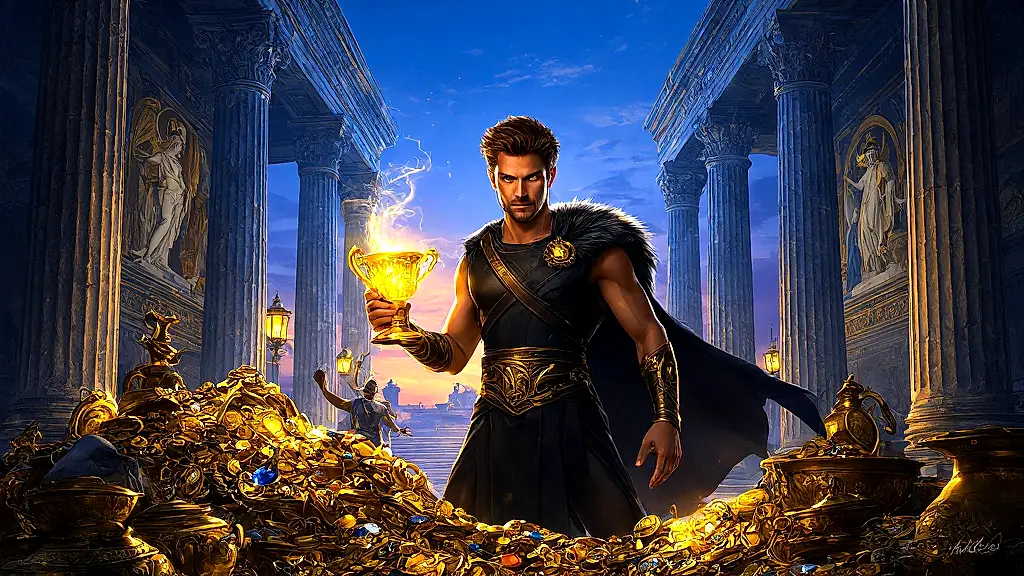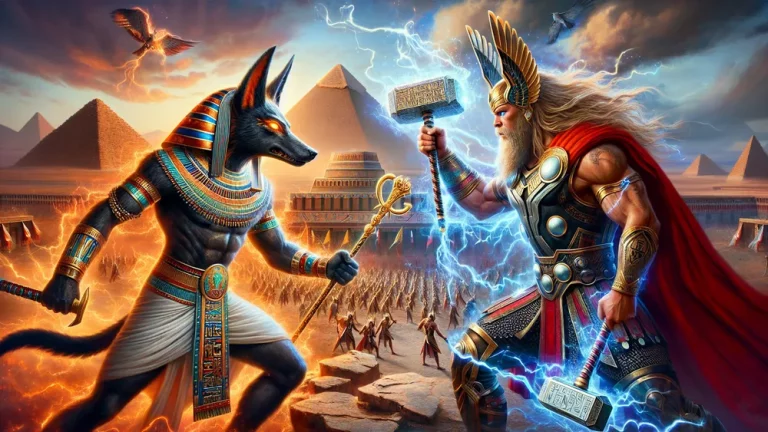Famous Tricksters In Greek Mythology And Their Clever Stories
Greek mythology features tricksters who don’t fit neatly into categories. They aren’t fully heroes or villains. Instead, they defy the gods, change the world with cleverness, and sometimes cause trouble. Think of them like ancient hackers – they expose weaknesses in the system. Or like comedians who point out society’s flaws. For example, Hermes steals Apollo’s cattle but also creates the lyre.
Key Points:
- Greek tricksters like Hermes and Prometheus don’t fit as pure heroes or villains but mix cleverness with trouble.
- Hermes stole Apollo’s cattle as a baby but later made the lyre, becoming the gods’ messenger and protector of thieves.
- Prometheus gave fire to humans against Zeus‘ will, leading to eternal punishment until Heracles freed him.
- Mortals like Sisyphus tricked Death itself, while Autolycus became the greatest thief by changing stolen items’ looks.
- Odysseus used tricks like the Trojan Horse and the Nobody ruse to survive but angered Poseidon in the process.
- These figures exposed flaws in divine and human systems, acting like ancient rule-breakers who revealed hard truths.
- Their stories left a lasting mark on Greek culture, from Hermes’ symbols to the idea that cleverness could challenge even the gods.
Prometheus gives fire to humans, even though Zeus forbids it. He pays a terrible price for this act. These characters have both good and bad traits. They also teach harsh truths about pride and overconfidence. Some tricksters are gods, like Eris, whose golden apple starts the Trojan War. Others are humans, like Sisyphus, who tricks Death itself.
Their stories appear in works like Hesiod’s Theogony and Homer’s Odyssey. But details change between regions and time periods. This shows how myths shift over time. Now, let’s look at their most famous tricks and how they disrupted the world.
Tricksters In Greek Mythology: Overview and Key Facts
| Name | Domain | Famous Trick | Divine/Mortal | Outcome |
|---|---|---|---|---|
| Hermes | Messengers, Thieves | Stole Apollo’s cattle as a baby and later invented the lyre | Divine | He ended up as the gods’ messenger and protector of thieves and travelers |
| Eris | Discord, Strife | She threw the Apple of Discord into a wedding, causing chaos | Divine | This led directly to the Trojan War, though myths disagree on why she did it |
| Prometheus | Fire, Forethought | He took fire from Olympus and gave it to humans | Divine (Titan) | Zeus punished him – chained to a rock, where an eagle ate his liver daily. Heracles later freed him |
| Sisyphus | Deception, Kings | He trapped Death in chains and tricked Persephone | Mortal | His punishment was endless – pushing a boulder uphill over and over in the Underworld |
| Autolycus | Theft, Trickery | A master thief who could change how objects looked | Mortal | He was never caught. Some myths say he even taught Odysseus, his grandson |
| Odysseus | Cunning, Warfare | Created the Trojan Horse and blinded Polyphemus | Mortal | He survived his 10-year journey home, but Poseidon made it extremely difficult |
(Note: Domains show their main roles, but some figures fit multiple categories. Different myths – like those by Hesiod or Homer – sometimes tell conflicting stories.)
What Makes a Greek Trickster?
Now we’ll look at the main qualities of these clever characters. You’ll see exactly how they differ from standard heroes or villains.
Key Qualities of the Archetype
Greek tricksters exist in gray areas, different from pure heroes or villains. They’re similar to complex characters we see today, who bend rules for unexpected results. These are the main characteristics we see repeatedly in myths:
- Wit over strength: Odysseus uses verbal trickery (“Nobody” ruse) to beat the Cyclops instead of fighting directly.
- Boundary-crossers: Hermes travels between Olympus, Earth, and the Underworld – a figure who operates in both official and unofficial roles.
- Masters of disguise: Autolycus changes how stolen items look, similar to how identity thieves operate today.
- Mixed morality: Prometheus helps humans but challenges Zeus, while Sisyphus gets eternal punishment for his selfish tricks.
- Agents of change: Eris’s Apple of Discord starts a war, but also exposes conflicts among the gods.
Unlike simple villains such as Typhon, tricksters don’t fit clear categories. Their actions can cause destruction or lead to progress. Next, we’ll examine how these traits appear in their most famous stories.

Greek tricksters blur lines between good and bad, using cleverness and rule-breaking to create chaos or change.
Why Do Tricksters Matter in Myths?
Greek tricksters act as key disruptors in mythology. They function similarly to whistleblowers, revealing flaws in both divine and human systems. Anthropologists note they serve as bridges between cultures, exposing social contradictions through their rule-breaking behavior. The Greeks called this strategic cleverness metis. They serve three main purposes. First, they advance stories – Eris’s golden apple directly starts the Trojan War.

Second, they represent Greek ideals that valued cleverness highly, shown by how Odysseus survives through wit alone. Third, they provide clear warnings about the both benefits and dangers of deception, like when Prometheus gives fire to humans but suffers eternal torment. These figures challenged authority while reinforcing social rules. Their actions ultimately defined what behavior was acceptable.
Different city-states emphasized various aspects – Athena particularly admired Odysseus’s cunning in Athens, while Sparta focused more on physical strength.
Divine Tricksters: The Mischief Makers
Next we’ll examine the Olympian rule-breakers – these divine disruptors pushed trickery to divine levels, which we’ll explore through their famous stories.
Hermes: The Sneaky Messenger
Hermes was born at dawn to Zeus and the nymph Maia, and showed his tricky nature immediately. Ancient texts describe how the baby god created the first lyre from a tortoise shell on his first day – this musical invention later became his gift to Apollo. These early actions shaped his mythological character as an Olympian who mixed clever play with important creations.
His boldest trick happened when he stole fifty of Apollo’s sacred cattle as an infant. To hide the theft, he made the cattle walk backward to confuse tracks, creating the first known example of reverse hoofprints. He then sacrificed two cows in an unusual ritual. When Apollo challenged him, the clever infant offered the new lyre as a gift.
This worked so well that Apollo not only forgave the theft but made Hermes protector of herds. Different Greek regions debated whether this showed proper cleverness or just divine mischief. Beyond tricks, Hermes performed multiple roles on Olympus. He served as the gods’ messenger with his winged sandals, guided souls to the Underworld, and protected travelers and thieves.
His caduceus staff became a symbol of diplomatic immunity, demonstrating Greek appreciation for clever communication. We can still see his legacy today in delivery services named after him, honoring his speed and ability to cross boundaries.
Eris: Goddess of Stirring Trouble
Eris, the goddess of conflict, had a special role in Greek mythology as the daughter of Nyx (Night) and sometimes considered sister to Ares. Unlike other tricksters who sought personal benefit, she specialized in making existing tensions worse. She functioned like a divine amplifier of disputes.
Her most famous action happened at the wedding of Peleus and Thetis, where she threw a golden apple marked “to the fairest” among Hera, Athena, and Aphrodite, understanding exactly this would start a rivalry. Some stories claim the gods didn’t invite her because they feared her disruptive nature.
Eris used calculated methods to spread chaos, though many dismissed her as simply malicious:
- Selective exclusion: She intentionally left people out to provoke reactions
- Ambiguous challenges: She created contests with unclear rules, like the beauty competition
- Rewards with consequences: She offered prizes that caused lasting effects (the apple led to Paris‘ judgment)
- Psychological tactics: She used existing conflicts rather than starting new ones
Archaeological finds show some cities worshipped Eris for competitive strife that encouraged progress. This dual nature makes her one of mythology’s most complicated tricksters. While disruptive, her actions often revealed important truths about gods and humans. The Trojan War that began with her apple became the most important conflict of Greek legend, proving how one divine trick could change history.
Prometheus: The Titan Who Stole Fire
Prometheus, whose name means “forethought,” was a Titan who fought with Zeus during the Titanomachy but later challenged the gods. Unlike other tricksters, he helped humans and revealed divine secrets. His first major rebellion happened when he tricked Zeus during a sacrifice, giving the god bones wrapped in fat while keeping the meat for humans. This led to their future conflict over fire.
He stole the divine fire in a hollow fennel stalk and brought it to earth. This gave humans warmth and cooking, but more importantly the basis for civilization. Different myths debate whether he stole it or returned what Zeus had taken, but every version shows this marked a change in how gods and humans interacted.
The fire represented human progress against divine control, making Prometheus the protector of human advancement. Zeus punished him severely for this rebellion. The Titan was chained to Mount Caucasus where an eagle ate his regenerating liver every day. Heracles eventually killed the eagle and freed Prometheus during his labors.
Some versions say Zeus permitted this to keep universal order, while others claim Heracles acted against Zeus’ will. The myth remains powerful because it shows the price of progress – fire lifted humans from darkness, but made the gods distrust them forever.

Mortal Tricksters: Humans Who Outsmarted the Gods
While the gods were masters of trickery, these bold humans showed mortals could equal or occasionally beat divine craftiness through pure wit and boldness.
Sisyphus: The Man Who Tricked Death
The crafty king of Corinth became famous for two never-before-seen tricks against death itself. When Thanatos came to take him, Sisyphus fooled the death god into showing how chains worked, then used those chains to trap Death. This temporarily prevented all deaths, causing complete disorder – battles dragged on endlessly and wounds never proved fatal until Ares stepped in.

This wasn’t just clever; it was direct defiance of nature’s laws. After eventually dying (the first time), Sisyphus pulled another trick. He told his wife Merope to skip the usual funeral rites, then persuaded Persephone to let him return temporarily to fix this disrespect. Once back among the living, he refused to go back and lived for years longer until dragged to the Underworld.
Different cities argued whether this showed brilliant thinking or dangerous arrogance – even gods couldn’t escape death forever. Zeus finally punished Sisyphus by making him eternally roll a boulder uphill, only to watch it roll back down. Philosophers saw this as symbolizing human struggle against fate. While other tricksters faced consequences, Sisyphus’ punishment became the perfect example of useless effort.
Yet some stories claim he still finds ways to rest briefly at the top, proving this ultimate trickster never stops trying.
Sisyphus outsmarted death twice, first by trapping the death god and later tricking Persephone, but was finally punished with eternal futile labor for defying nature’s laws.
Autolycus: The Ultimate Thief
Hermes gave his son Autolycus two special abilities: he could change the appearance of stolen items and never get caught. This made him history’s greatest thief. His name meant “the wolf itself,” which matched his thieving behavior. Ancient texts say he could transform not just stolen goods but his own looks, making him the first master of disguise. He entered kingdoms and took their treasures without being noticed.
His most famous achievements included:
- Stealing Sisyphus’ cattle by transforming their colors and markings
- Teaching deception and archery to his grandson Odysseus
- Raiding multiple kingdoms successfully and leaving no traces
- Using clever wording to keep his oath (he returned stolen items only to temples)
Unlike other tricksters who were punished, Autolycus shows how gods sometimes rewarded cleverness. His skills were a divine gift from Hermes, proving that in Greek myths, even theft could be seen as skilled practice when done well enough.

Odysseus: The Master of Deception
Odysseus was the perfect example of a clever Greek hero, favored by Athena for his sharp mind. Later stories claimed Autolycus the thief was his grandfather, showing he inherited trickery. While other heroes used strength, Odysseus preferred clever speech and complicated plans.
His most famous tricks included:
- The Trojan Horse: He persuaded the Trojans to accept a wooden horse full of soldiers
- Cyclops Escape: He told Polyphemus his name was “Nobody” to avoid punishment from gods
- Disguised Beggar: He came back to Ithaca dressed poorly to test who was loyal
- False Stories: He made up detailed fake histories when needed
- Achilles‘ Discovery: He tricked the young warrior into showing himself
These tricks saved lives but caused problems. The Cyclops deception angered Poseidon, making his journey home longer. His constant lies made even allies distrust him. Some stories say he died because someone didn’t believe his final trick. Odysseus shows the Greek value of practical intelligence – how cleverness could both help and cause trouble.
Side-by-Side: Greek Tricksters
We’ve examined each one separately, so now we’ll compare these clever characters by looking at their best tricks and final results in one view.
The Lasting Impact of Trickery
Their stories were entertaining, but these tricksters had a lasting effect on Greek culture. More importantly, we’ll examine their long-term impact and conflicts with gods.
How Tricksters Left Their Mark on Greek Culture
The tricksters’ impact appears throughout ancient Greek society. Stone markers called herms, dedicated to Hermes, protected travelers at crossroads. Comedy masks often showed smart slaves outwitting their masters. The concept of metis (cunning intelligence) became important in Athenian democracy, shown by Odysseus’ fame as a speaker who could persuade people effectively. Moreover, Prometheus’ fire theft turned into a cultural symbol for human progress, honored in Athenian torch races.
Even today’s medical symbol, the caduceus, comes from Hermes’ staff. These tricksters’ areas of influence – commerce, communication, and boundaries – became permanent parts of Western culture through religious practices, art, and philosophy that honored cleverness along with traditional heroism.
How Tricksters Riled Up the Gods
The tricksters showed their greatest boldness by challenging the gods directly. Prometheus stole fire, which made Zeus create Pandora as a response. Sisyphus temporarily captured Death, angering Hades so much that he designed an eternal punishment of endless, useless labor. Even Hermes, though he eventually joined the gods, first had to make amends to Apollo after stealing his cattle. This proves the gods only accepted trickery when it ultimately supported their power.
These actions weren’t just personal insults but direct challenges to divine rules that threatened the divine world order. The gods responded in specific ways: physical pain (Prometheus’ liver being eaten daily), mental torture (Sisyphus’ impossible task), or forced journeys (Odysseus’ long trip home). However, the smartest tricksters often got lighter punishments. Hermes negotiated his way to godhood, and Prometheus was freed eventually.

This suggests Greek culture respected cleverness even when it went too far. The myths give us clear warnings about the dangers of outsmarting those in charge, while showing the gods might appreciate a good trick if it didn’t challenge their ultimate authority.
FAQs
1. Who was the most clever Greek trickster?
The most clever Greek trickster was Hermes, whose legendary theft of Apollo’s cattle and invention of the lyre showcased unmatched cunning.
2. Are tricksters villains or heroes?
Tricksters are neither purely villains nor heroes but morally ambivalent figures who defy simple categorization.
3. How do Greek tricksters compare to Loki?
Greek tricksters compare to Loki in their cunning, but they typically embody ambivalent roles as teachers or cultural disruptors, whereas Loki leans toward outright chaos and destruction in Norse mythology.
4. Did any trickster win against the gods?
Some tricksters won against the gods in partial or temporary victories, like Prometheus’ eventual freedom or Autolycus’ evasion of divine retribution.







